Nebula Study guides, Class notes & Summaries
Looking for the best study guides, study notes and summaries about Nebula? On this page you'll find 211 study documents about Nebula.
All 211 results
Sort by
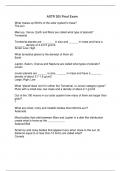 Popular
Popular
-
ASTR 205 Final Exam
- Exam (elaborations) • 7 pages • 2023
-
Available in package deal
-
- $10.00
- 1x sold
- + learn more
What makes up 99.8% of the solar system's mass? The sun Mercury, Venus, Earth and Mars are called what type of planets? Terrestrial Terrestrial planets are ________ in size and ______ in mass and have a _______ density of 3.9-5.5 g/cm3 Small; Low; High What terrestrial planet is the densest of them all. Earth Jupiter, Saturn, Uranus and Neptune are called what types of planets? Jovian Jovian planets are ______ is size, ______ in mass and have a _______ density of about 0.7-1.6 g/cm...
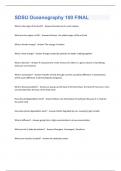 Popular
Popular
-
SDSU Oceanography 100 FINAL Questions With Correct Solutions, Already Passed!!
- Exam (elaborations) • 11 pages • 2024 Popular
- Available in package deal
-
- $7.99
- 1x sold
- + learn more
What is the origin of the Earth? - Answer-Formed out of a solar nebula What are the origins of Life? - Answer-Archaea - the oldest origin of life on Earth What is kinetic energy? - Answer-The energy of motion What is heat energy? - Answer-Energy created by particles of matter rubbing together What is density? - Answer-A measurement of the amount of matter in a given volume of something. (mass per unit volume) What is convection? - Answer-Transfer of heat through currents caused by differen...
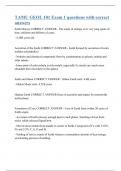
-
TAMU GEOL 101 Exam 1 questions with correct answers
- Exam (elaborations) • 20 pages • 2023
- Available in package deal
-
- $14.49
- + learn more
Earth History CORRECT ANSWER - The study of change over very long spans of time: millions and billions of years. - 4.56B years old Accretion of the Earth CORRECT ANSWER - Earth formed by accretion of rocky nodules (chondrules) - Nodules and chemical compounds form by condensation in galactic nebula and solar nebula - Inner parts of solar nebula is rich metals, especially Fe metals are much more abundant then elsewhere in the galaxy Earth and Moon CORRECT ANSWER - Oldest Earth rock: 4.4B...
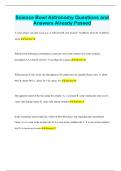
-
Science Bowl Astronomy Questions and Answers Already Passed
- Exam (elaborations) • 26 pages • 2024
- Available in package deal
-
- $9.99
- + learn more
Science Bowl Astronomy Questions and Answers Already Passed A solar eclipse can only occur at a: A. full moon B. new moon C. 1⁄2 gibbous moon D. 1⁄4 gibbous moon Answer: B Which of the following constellations cannot be seen in the summer sky of the northern hemisphere? A. Libra B. Orion C. Ursa Major D. Cygnus Answer: B What percent of stars in the sky that appear to be single stars are actually binary stars: A. about 90% B. about 50% C. about 20 % D. about .5% Answer: B T...
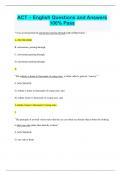
-
ACT – English Questions and Answers 100% Pass
- Exam (elaborations) • 26 pages • 2024
- Available in package deal
-
- $11.94
- + learn more
ACT – English Questions and Answers 100% Pass "I was an inexperienced astronomer peering through light-polluted skies." A. NO CHANGE B. astronomer, peering through, C. astronomer:peering through D. astronomer peering through, A "The nebula, is home to thousands of young stars, is often called a galactic "nursery"." F. NO CHANGE G. nebula is home to thousands of young stars, and H. nebula, home to thousands of young stars, and J. nebula, home to thousand of young stars, J "...
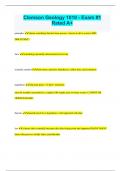
-
Clemson Geology 1010 - Exam #1 Rated A+
- Exam (elaborations) • 27 pages • 2024
- Available in package deal
-
- $9.99
- + learn more
Clemson Geology 1010 - Exam #1 Rated A+ principles claims something that has been proven - known to all as correct (BIG DISCOVERY) facts something repeatedly demonstrated to be true scientific method observation, question, hypothesis, collect data, and evaluation hypothesis educated guess; "if-then" statement; must be testable; be predictive; complex OR simple; past or future events; CANNOT BE OPINION BASED theories repeated proof for a hypothesis; well supported with data law a theory th...
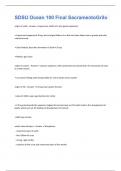
-
SDSU Ocean 100 Final SacramentoGrilo Questions and Answers 100% Solved correctly
- Exam (elaborations) • 24 pages • 2024
- Available in package deal
-
- $7.99
- + learn more
origin of earth - Answer-• Supernova: death of a star (great explosion) • Supernova happened 4.6 bya, dust and gas flattens to a disk and spins faster due to gravity and solar nebula formed. • Solar Nebula: describes formation of Earth 4.5 bya • Nebula: gas cloud origin of oceans - Answer-• volcanic explosion, H2O condensed and rained down for thousands of years to create oceans • icy comets hitting earth (responsible for 1/2 of earths ocean water) origin of life - Answer-•...
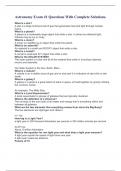
-
Astronomy Exam #1 Questions With Complete Solutions.
- Exam (elaborations) • 10 pages • 2023
-
- $13.49
- + learn more
Astronomy Exam #1 Questions With Complete Solutions. What is a star? A star is a large luminous ball of gas that generates heat and light through nuclear fusion. What is a planet? A planet is a moderately large object that orbits a star. It shines by reflected light. Planets may be icy or rocky What is a moon? A moon (or satellite) is an object that orbits the planet. What is an asteroid? An asteroid is a small and ROCKY object that orbits a star. What is a comet? A comet is small a...
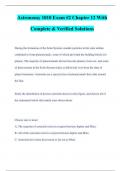
-
Astronomy 1010 Exam #2 Chapter 12 With Complete & Verified Solutions
- Exam (elaborations) • 12 pages • 2023
-
- $10.49
- + learn more
During the formation of the Solar System, smaller particles in the solar nebula combined to form planetesimals, some of which provided the building blocks for planets. The majority of planetesimals did not become planets, however, and some of them remain in the Solar System today as debris left over from the time of planet formation. Asteroids are a special class of planetesimals that orbit around the Sun. Study the distribution of known asteroids shown in this figure, and choose all of t...
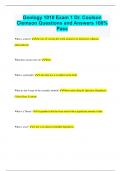
-
Geology 1010 Exam 1 Dr. Coulson Clemson Questions and Answers 100% Pass
- Exam (elaborations) • 26 pages • 2024
- Available in package deal
-
- $9.99
- + learn more
Geology 1010 Exam 1 Dr. Coulson Clemson Questions and Answers 100% Pass What is science? One way of viewing the world around us ex.(historical, religious, philosophical) What does science rely on? Facts What is a principle? A fact that was a revelation in the field. What are the 4 steps of the scientific method? Observation (Step 0), Question, Hypothesis, Collect Data, Evaluate What is a Theory? A hypothesis that has been tested with a significant amount of data. What is a law? A law is an ...

That summary you just bought made someone very happy. Also get paid weekly? Sell your study resources on Stuvia! Discover all about earning on Stuvia


